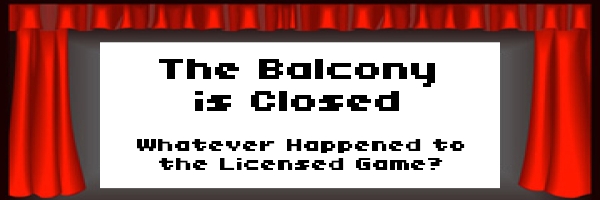
In case there was any doubt, Thor and his mighty hammer have officially opened the 2011 Summer movie season today. What will follow is four months of blockbusters that will be heavy on action and even heavier on reviews comparing their visuals to video games. But as Hollywood and Redmond trade ideas back and forth, the once great institution that is the licensed game has gone by the wayside.
Okay, “once great institution” might be the nostalgia talking, but licensed games were always plentiful, even if they weren’t always good games. We all know the story of Atari practically bankrupting themselves to produce the woefully bad E.T. game for the Atari 2600. And Acclaim’s history of low review scores (and eventual bankruptcy) could be attributed to the company’s string of licensed games.
But titles like GoldenEye and The Chronicles of Riddick prove that a licensed game doesn’t have to be a cheaply made cash-in. They can be classics. Yet their number is decreasing, even as gamemakers have embraced the trappings of Hollywood during the development process.
Lights! Cameras!… Press Start?
Nowhere is this more apparent than at Naughty Dog as they work on Uncharted 3. The studio doesn’t consider Uncharted 3 a game, but an “interactive cinematic experience.” The developer has built a giant motion capture studio and they film some of the game’s action setpieces in a way that is indistinguishable from a CGI blockbuster like Avatar.
Hollywoodized development cultures are just the beginning. Every major publisher has begun to dip their toes into the movie business. Publishers like 2K Games (Prey 2), WB Games (FEAR 3) and Sony (Resistance 3) have all experimented with live action trailers to promote some of their biggest releases. Electronic Arts (Dead Space, Dante’s Inferno) and THQ (Red Faction: Armageddon) have dabbled in Direct-to-DVD films released alongside their more cinematic offerings. And just this past week, Ubisoft created a film production studio to bring some of their original properties to the big scsreen.
Even Activision, who has been staunchly supportive of licensed games this generation, has recruited a quartet of horror icons to “act” in the latest Call of Duty: Black Ops expansion: “Call of the Dead.” By all accounts, the experience is a tremendous success and I’ve seen more than one forum post suggesting that the scenario needs to become an actual movie.
However, the most important melding of games and movies has to be L.A. Noire‘s inclusion in this year’s Tribeca Film Festival. Using a sophisticated facial imaging program, Team Bondi and Rockstar Games have created a game that requires the player (as a detective investigating a murder) to read people’s reactions to a line of questioning. Combined with the moody sensibilities of film noir and hardboiled pulp fiction of the era, L.A. Noire will likely become the new go-to game when people refer to ‘adult’ storylines in video games.
Game Executives: “Licensed games are dead”
As developers strive to capture a little piece of the Hollywood process, game executives are attempting to push Hollywood away. EA Games president Frank Gibeau told Develop “the days of licensed-based, 75-rated games […] are dead like the dinosaur.” He later confirmed that this was the reason the company dropped the James Bond license.
Gibeau isn’t the only executive to bash the tie-in game. As development was winding down on the very film-like Homefront, THQ CEO Brian Farrell told investors “the single-player, ‘see the movie, play the game’ experience is what seems, at this time, not to be working.” Ben Feder, CEO of Take-Two Interactive, went a step further and said “licensing content is dead” at this year’s Digital Hollywood conference.
Publishers just don’t seem to have confidence in any licensed properties anymore. Ghostbusters: The Video Game was released in 2009 and touted as the Ghostbusters III Dan Aykroyd has been trying to get made for decades. The game was well reviewed and sold well, but not spectacularly so. So when it came time for Atari to create a sequel, they downgraded the series to the PSN/XBLA. Ghostbusters: Sanctum of Slime was pretty poorly received and I don’t forsee another game based on the franchise coming anytime soon.
However, not all developers or executives believe that licensed content is a dead end. Telltale Games CEO Dan Connors referenced Feder’s comments directly and told Gamasutra that his company is a strong supporter of creating licensed content and lays the blame of poor sales on the lack of effort some developers put into tie-in games: “On the one side you’re hearing all this talk about licensing not being viable anymore [in the game industry] and it can’t succeed. In our mind, of course they can succeed. There’s a big audience that’s interested in this content. You just have to build it right for them.”
For the most part, Telltale is one of the only companies championing licensed content in today’s gaming landscape, announcing games based on Jurassic Park (which is a side story to the first film), “Law & Order: Los Angeles,” and Back to the Future (which promises to give players the Back to the Future Part IV they always wanted) to digital distribution channels in recent months.







